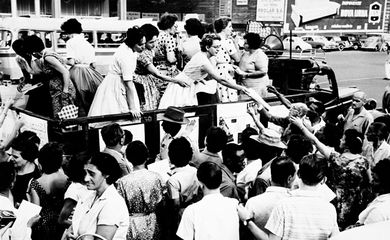Tribute paid to “Viva Maria” radio program in Argentina


Announcer Mara Régia, from the Rádio Nacional da Amazônia, describes Viva Maria as a program created to break the silence about violence against women.

A program created to break the silence about violence against women—this is how announcer Mara Régia, from the Rádio Nacional da Amazônia, describes Viva Maria, a radio program that celebrated its 33rd anniversary on Sunday (Sep 14). The program and the announcer will be the subject of a tribute at the Primer Congreso Latinoamericano de Defensorías de Las Audiencias (literally: First Latin-American Congress of Public Defenders’ Offices of the Audiences, in Buenos Aires, which starts today (15), with a debate on women’s Latin-American image in the media.
Organized by Argentina’s Public Defenders’ Office for the Audience, founded through the so-called Law of Media, which aims to ensure the exercise of human rights in the means of communication in that country, the meeting gathers ombudsmen and representatives from communication companies from several nations. In Buenos Aires, they are expected to sign a letter of commitments in an attempt to bolster gender equality and fight violence against women.
The date for both the gathering and the tributes was chosen deliberately, as one of Viva Maria’s anniversaries in the 1990’s inspired the creation of the Latin-American Day for the Image of Women in the Media, also celebrated on September 14. Today, the date is part of the official calendar of UN Women, an organization connected with the United Nations Entity for Gender Equality and the Empowerment of Women.
At the congress, Mara Régia will deliver the opening lecture by talking about the history of women’s struggle. Surprised by the tribute, she revealed that she will address the topic “how you can change society and build a culture asserting our rights through the voice of women in the means of communication”.
The announcer declares that the years in which Viva Maria was produced showed how communication and the defense of rights are closely related. Originally created as a result of the indignation “over the way the media approached women, who are victims,” the radio program contributed to making their rights better known—and, on top of that, it tried to urge women to act together, especially in the regions covered by the Rádio Nacional da Amazônia.
Today, apart from the radios connected with the Brazil Communication Company (“EBC”), the program is aired by nearly 1,500 radio stations.
In Argentina, EBC is expected to sign the letter of commitments of the congress, which suggests, among other things, the development of joint efforts in a bid to raise people’s awareness, and promote gender equality and the debate about the use in the media of a language that is non-sexist, inclusive and respectful.
Translated by Fabrício Ferreira
Fonte: Tribute paid to “Viva Maria” radio program in Argentina



